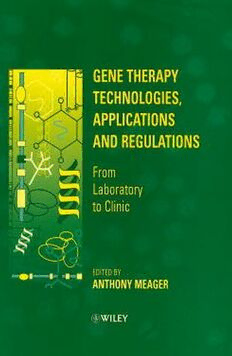
Gene Therapy Technologies, Applications and Regulations: From Laboratory to Clinic PDF
Preview Gene Therapy Technologies, Applications and Regulations: From Laboratory to Clinic
GeneTherapyTechnologies,ApplicationsandRegulations.EditedbyAnthonyMeager Copyright©1999JohnWiley&SonsLtd PrintISBN0-471-976709-2ElectronicISBN0-470-84238-5 Gene Therapy Technologies, Applications and Regulations GeneTherapyTechnologies,ApplicationsandRegulations.EditedbyAnthonyMeager Copyright©1999JohnWiley&SonsLtd PrintISBN0-471-976709-2ElectronicISBN0-470-84238-5 Gene Therapy Tecnologies, Applications and Regulations FROM LABORATORY TO CLINIC Editedby ANTHONYMEAGER DivisionofImmunobiology,TheNationalInstituteforBiologicalStandardsandControl, SouthMimms,UK JOHNWILEY&SONSLTD Chichester·NewYork·Weinheim·Brisbane·Singapore·Toronto GeneTherapyTechnologies,ApplicationsandRegulations.EditedbyAnthonyMeager Copyright©1999JohnWiley&SonsLtd PrintISBN0-471-976709-2ElectronicISBN0-470-84238-5 Copyright©1999byJohnWiley&SonsLtd, BaffinsLane,Chichester, WestSussexPO191UD,England National 01243779777 International(+44)1243779777 e-mail(forordersandcustomerserviceenquiries):cs-bookswiley.co.uk VisitourHomePageonhttp://www.wiley.co.uk orhhtp://www.wiley.com Allrightsreserved.Nopartofthispublicationmaybereproduced,storedinaretrieval system,ortransmitted,inanyformorbyanymeans,electronic,mechanical,photocopying, recording,scanningorotherwise,exceptunderthetermsoftheCopyright,Designsand PatentsAct1988orunderthetermsofalicenceissuedbytheCopyrightLicensingAgency,90 TottenhamCourtRoad,London,UKW1P9HE,withoutthepermissioninwritingofthe publisher. CommissionedintheUKonbehalfofJohnWiley&Sons,Ltd byMedi-TechPublications,Storrington,WestSussexRH204HH,UK. OtherWileyEditorialOffices JohnWiley&Sons,Inc.,605ThirdAvenue, NewYork,NY10158-0012,USA VCHVerlagsgesellschaftmbH,Pappelallee3, D-69469Weinheim,Germany JacarandaWileyLtd,33ParkRoad,Milton, Queensland4064,Australia JohnWiley&Sons(Asia)PteLtd,2ClementiLoop(cid:1)02-01, JinXingDistripark,Singapore129809 JohnWiley&Sons(Canada)Ltd,22WorcesterRoad, Rexdale,OntarioM9W1L1,Canada LibraryofCongressCataloging-in-PublicationData Genetherapytechnologies,applications,andregulations:fromlaboratorytoclinic/editedby AnthonyMeager. p. cm. Includesbibliographicalreferencesandindex. ISBN0-471-96709-2(alk.paper) 1.Genetherapy. I.Meager,Anthony. [DNLM:1.GeneTherapy–methods. QZ50 G3216 1999] RB155.8.G467 1999 616'.042–dc21 DNLM/DLC 99-15301 forLibraryofCongress CIP BritishLibraryCataloguinginPublicationData AcataloguerecordforthisbookisavailablefromtheBritishLibrary ISBN0471967092 Typesetin10/12ptPalatinobyVisionTypesetting,Manchester PrintedandboundinGreatBritainbyBiddlesLtd,GuildfordandKing’sLynn Thisbookisprintedonacid-freepaperresponsiblymanufacturedfromsustainableforestry, forwhichatleasttwotreesareplantedforeachoneusedforpaperproduction. GeneTherapyTechnologies,ApplicationsandRegulations.EditedbyAnthonyMeager Copyright©1999JohnWiley&SonsLtd PrintISBN0-471-976709-2ElectronicISBN0-470-84238-5 Contents Listofcontributors xv Preface xxi 1 CationicLiposomesforGeneTherapyApplications 1 J.P.ClancyandEricS.Sorscher 1.1 Introduction 1 1.2 Mechanismofactionofcationicliposomes 1 1.3 Lipid-mediatedgenetransfertopolarizedepithelium 3 1.4 Cationiclipiddrugdiscovery 3 1.5 Lipidretargeting 4 1.6 Plasmidmodification 5 1.7 Preclinicalandclinicaltrials 6 1.8 Regulatoryissuesregardinglipid–DNAcomplexes 7 1.9 Summary 9 2 DNACondensationandReceptor-mediatedGeneTransfer 13 AssemZiadyandThomasFerkol 2.1 Introduction 13 2.2 Receptor-mediatedgenetransfer 14 2.2.1 Targetingligand 16 2.2.1.1 Asialoglycoproteinreceptor 16 2.2.1.2 Transferrinreceptor 20 2.2.1.3 Polymericimmunoglobulinreceptor 21 2.2.1.4 Mannosereceptor 22 2.2.2 DNAcondensationandcomplexformation 23 2.2.3 Endosomaltraffickingandescape 25 2.2.4 Nucleartargetingandtranslocation 27 2.3 Conclusions 28 3 RetroviralVectors 35 WalterH.Gu¨nzburgandBrianSalmons 3.1 Introduction 35 3.2 Theretroviralreplicationcycle 36 3.2.1 Earlyevents 36 3.2.2 IntegrationofviralDNAintohostgenomicDNA 36 3.2.3 Transcription,translationandassembly 38 vi CONTENTS 3.3 Retroviralvectordevelopment 39 3.3.1 Principles 40 3.3.2 Improvements 41 3.4 Infectiontargeting 43 3.5 Geneexpressionfromretroviralvectors 45 3.5.1 Generalconsiderations 45 3.5.2 Expressiontargeting 48 3.5.3 Inducibleexpression 48 3.6 Retoviralvectortitresandstability 49 3.7 Lentiviralvectors 52 3.8 Conclusionsandperspectives 53 4 LentiviralVectors 61 AndrewM.L.Lever 4.1 Introduction 61 4.2 Geneticstructureoflentiviruses 62 4.2.1 Advantagesoflentiviralvectors 67 4.2.2 Disavantagesoflentiviralvectors 67 4.3 Lentivirus-basedvectors 67 4.3.1 Otherinfluencesonpackaging 68 4.3.2 Directgenetransfer 70 4.3.3 Helpervirusmediated 70 4.3.4 Co-transfectionsystems 71 4.3.4.1 Envelopecomplementation 71 4.3.4.2 Co-transfectionusingindependentvectorand packagingconstructs 71 4.3.4.3 Three-plasmidco-transfections 76 4.3.5 Packagingcelllines 78 4.3.5.1 Problemproteins 79 4.3.5.2 Inducibleconstructs 80 4.3.6 Envelopepseudotyping 80 4.3.7 Proteindelivery 81 4.3.8 Viraltitres 81 4.4 Rangeofapplications 82 4.5 Safety 82 5 AdenoviralVectors 87 SheilaConnelly 5.1 Introduction 87 5.2 Structureandgenomicorganizationofhumanadenoviruses 88 5.3 Designandconstructionofreplication-defectivehuman adenoviralvectors 90 CONTENTS vii 5.4 Propagationandpurificationofadenoviralvectors 94 5.5 Invivoadenovirus-mediatedgenetransfer 95 5.6 Circumventingthehostimmuneresponsetoinvivo adenoviralgenetransfer 97 5.7 Summary 99 6 Adeno-associatedViralVectors 109 TerenceR.FlotteandBarrieJ.Carter 6.1 Introduction 109 6.2 BiologyofAAV 109 6.2.1 AAVtaxonomyandnaturalhistory 109 6.2.2 ThestructureofAAVanditsgenome 110 6.2.3 TheAAVlifecycle 112 6.2.4 Site-specificityofAAVintegration 113 6.3 AAV-derivedrecombinantvectors 114 6.3.1 StructureofrecombinantAAVvectors 114 6.3.2 StrategiesforpackagingAAVrecombinantvectors 114 6.3.3 PersistenceofvectorDNAintargetcells 116 6.3.4 HostcellfactorsaffectingAAVvector transduction 116 6.3.5 Summaryofadvantagesanddisadvantagesof AAVtransducingvectors 117 6.4 ApplicationsofAAVvectors 117 6.4.1 Invitroapplications 118 6.4.2 Invivoapplications 120 6.5 Safetyissues 120 6.5.1 Subjectsafety 120 6.5.2 Environmentalsafety 121 7 AdvancesinEngineeringHSVVectorsforGeneTransfer totheNervousSystem 127 M.KarinaSoares,WilliamF.Goins,JosephC.Gloriosoand DavidJ.Fink 7.1 Introduction 127 7.2 HSVbiology 129 7.3 DevelopmentofHSVvectorsforthenervoussystem 131 7.3.1 Deletionofaccessoryfunctionstoincreasethecapacity forforeigngenes 132 7.3.2 Vector-associatedcytotoxicity 133 7.3.3 Promotersystemsfortransgeneexpression 136 7.3.3.1 Transientexpression 137 7.3.3.2 Long-termexpression 138 7.3.3.3 Regulatedtransgeneexpression 142 viii CONTENTS 7.3.4 HSVamplicons 143 7.3.5 NovelhybridHSV–AAVvectors 144 7.4 Summaryandfuturedirections 144 8 MammalianArtificialChromosomes:Prospectsfor GeneTherapy 165 TomA.EbersoleandChristineJ.Farr 8.1 Introduction 165 8.2 WhybuildaMAC? 165 8.3 TheidealMAC 166 8.4 StrategiesforgeneratingaMAC 167 8.4.1 Thetop-downapproach 168 8.4.2 Thebottom-upapproach 171 8.5 Practicalproblemsandunknowns 173 8.6 Concludingremarks 174 9 GeneTherapyforSevereCombinedImmunodeficiency 179 AdrianJ.Thrasher,HubertB.Gasparand ChristineKinnon 9.1 Introduction 179 9.2 MolecularpathologyofSCID 179 9.2.1 X-linkedseverecombinedimmunodeficiency 180 9.2.2 JAK-3defects 180 9.2.3 Adenosinedeaminaseandpurinenucleoside phosphorylasedeficiencies 181 9.2.4 Recombinantactivatinggenes(RAG1andRAG2) defects 181 9.2.5 ZAP70defects 181 9.2.6 MHCclassIdeficiency(type1barelymphocyte syndrome) 181 9.2.7 MHCclassIIdeficiency(type2barelymphocyte syndrome) 182 9.2.8 TCR-CD3abnormalities 182 9.3 SomaticgenetherapyforSCID 182 9.3.1 ClinicalgenetherapyforADA-SCID 183 9.3.2 TlymphocytegenetherapyforADA-SCID 184 9.3.3 StemcellgenetherapyforADA-SCID 185 9.3.4 Limitingfactorsforstemcellgenetherapy 186 9.4 Alternativevectorsystems 186 9.5 Pre-clinicalassessmentofhaematopoieticstemcell genetransfer 187 9.6 Conclusions 187 CONTENTS ix 10 GeneTherapyforHaemophilia 195 RobC.Hoeben,FrederikH.E.Schagen,MarjolijnM.vanderEb, FritsJ.Fallaux,AlexJ.vanderEbandHansvanOrmondt 10.1 Introduction 195 10.2 GenetherapyforhaemophiliaA 196 10.2.1 PropertiesoffactorVIII 196 10.2.2 Exvivogenetherapy:problemswithretroviralvectors 196 10.2.3 Implantationofretrovirally-transducedcells 199 10.2.4 Invivogenetherapy:encouragingresultswith adenoviralvectors 200 10.3 GenetherapyforhaemophiliaB 201 10.4 Wheredowegofromhere? 202 11 CysticFibrosis:GeneTherapyApproaches 207 NatashaJ.Caplen 11.1 Introduction 207 11.2 Thegeneticsofcysticfibrosis 207 11.3 CFTRproteinanddiseasepathology 208 11.4 Treatmentforcysticfibrosis 209 11.5 Genetransfersystemsandcysticfibrosis 209 11.5.1 Background 209 11.5.2 Retroviral-mediatedgenetransfer 210 11.5.3 Adenoviral-mediatedgenetransfer 211 11.5.4 Adeno-associated-viral-mediatedgenetransfer 214 11.5.5 Cationiclipid-mediatedgenetransfer 215 11.5.6 Othergenetransfersystems 217 11.6 GenetansferandCF:willitwork? 218 12 TherapeuticApproachestoHaemoglobinopathies 227 YvesBeuzard 12.1 Introduction 227 12.2 Globinretoviralvector 229 12.3 Adeno-associatedviralvectors 231 12.4 Homologousrecombinationandrepair 232 12.5 Indirectgenetherapiesfor(cid:1)thalassaemia 232 12.5.1 Correctionofabnormalsplicing 233 12.5.2 Activationofcompensatinggenes 233 12.5.3 Erythropoietingenetransfer 233 12.5.4 Reductionof(cid:2)globingeneexpression 234 12.5.5 Othertherapeuticgenes 235 12.6 Sicklecelldisease 236 12.7 Futureprospects 236 x CONTENTS 13 GeneTherapyApproachestoDuchenneMuscularDystrophy 243 StephenMurphyandGeorgeDickson 13.1 Introduction 243 13.2 Clinicalandpathologicalfeatures 243 13.3 Thedystrophingeneanditsproducts 244 13.4 Thelocalisationandfunctionofdystrophin 247 13.5 ModelsystemsofDMD 250 13.6 TherapeuticapproachestowardsthetreatmentofDMD 251 13.7 CelltherapyforDMD:myoblasttransfer 252 13.8 GenetherapiesforDMD 253 13.8.1 DirectDNAinjection 254 13.8.2 Retrovirusvectors 255 13.8.3 Adenovirusvectors 257 13.9 Alternativetherapeuticstrategies 259 13.10 Conclusions 260 14 LysosomalStorageDiseases 267 LindaS.Lashford,LeslieJ.FairbairnandJ.E.Wraith 14.1 Introduction 267 14.2 Definingthepatientpopulation 269 14.2.1 Therelationshipbetweengenotypeandphenotype 269 14.3 Standardand‘experimental’treatments 271 14.3.1 Supportivecare 271 14.3.2 Enzymereplacement 271 14.3.3 Bonemarrowtransplant 273 14.4 Tissuetargetsforgenetherapy 275 14.4.1 Transplantsof‘neo-organs’ 275 14.4.2 Manipulationofprimarylymphocytes 277 14.4.3 Autologousbonemarrow 278 14.4.4 DirecttargetingofCNS 281 14.5 Summary 284 15 ProspectsforGeneTherapyofHIVInfectionsandAIDS 291 CarolineG.L.Lee,MichaelM.GottesmanandKuan-TehJeang 15.1 Introduction 291 15.2 LifecycleofHIV 292 15.2.1 Receptors 293 15.2.2 Intracellularevents 296 15.3 Strategiesforantiviraltherapy 296 15.3.1 InterferencewithHIV-1replication 297 15.3.1.1 Interferingwithvirusentry 297 15.3.1.2 Interferingwithtranscription/translation and/orvirusassembly 297 CONTENTS xi 15.3.2 Inductionofcelldeath 301 15.3.3 Immunizationandaugmentationofimmunefunction 302 15.4 Deliveryandselectionstrategiesforgeneticantiviral intervention 303 16 TheDevelopmentoftheRegulatoryProcessinEuropefor BiologicalMedicines:howitAffectsGeneTherapyProducts 319 AnthonyMeager,TobiasVockeandGerdZimmermann 16.1 RegulationofbiologicsinEurope 319 16.1.1 Historicalintroduction 319 16.1.2 Classificationandcharacteristicsofbiologics 322 16.1.3 Theemergenceofgeneticmedicines:arethey biologics? 323 16.2 Guidanceformanufacturersandregulatoryprocedures applyingtobiologicalmedicinesinEurope 325 16.3 Developmentsinqualityassuranceforbiologics: applicationtogenetherapyproducts 330 16.4 Qualityassuranceissues 335 16.4.1 Stabilityoftheexpressionvector 335 16.4.2 Producercell-andvector-DNA 336 16.4.3 Themanufacturingprocess 336 16.4.3.1 Cellbankingsystem 337 16.4.3.2 Fermentation 337 16.4.3.3 Purification 338 16.4.4 Specificationsandqualitycontrol 339 16.4.4.1 Safetyandpurity 339 16.4.4.2 Biologicalactivity(potency) 340 16.4.4.3 Regulatoryaspects,standardisation,and batchrelease 341 16.5 Safetyissues 342 17 DevelopmentandRegulationofGeneTherapyDrugsin Germany 347 KlausCichutek 17.1 Introductoryremarks 347 17.2 Definition 348 17.3 Preclinicalresearchanddevelopment 350 17.4 Manufactureofdrugsandingredientsforclinicaluse 352 17.5 Clinicaltrialsofgenetherapydrugs 353 17.6 On-goingorplannedgenetherapytrialsinGermany 354 17.7 InvolvementofthePaul-Ehrlich-Institutingenetherapy 355
